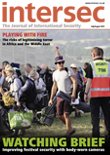Curing PREVENT
Anthony Tucker-Jones reports on Britain’s counter-radicalisation strategy and asks whether it still working
In 2014 the UK’s highly controversial Prevent counter-radicalisation strategy was rocked by allegations that militant Islam had set up shop in Birmingham’s state schools. The so-called “Trojan Horse” plot highlighted the ongoing failure to safeguard the country’s young Muslims from an Islamist hard-line agenda. Although the issue was in part fuelled by media scaremongering, it was highly damaging to community relations. In particular the authorities were criticised for their inertia in tackling the problem head-on.
Prevent came in for renewed criticism in early 2015 after three Muslim teenage girls flew to Syria via Turkey to join ISIS. Just how many impressionable teenagers have already followed this route is unknown. The police have admitted that at the end of 2014 another 15-year-old fellow pupil vanished after heading for Syria; her 15-year-old friend was stopped at the last minute on the runway of Heathrow airport. Recriminations abound over how five pupils, all friends, from Bethnal Green Academy in east London, became radicalised and why only one of them was caught.
What is disturbing is that the three girls who travelled in February this year are all described as “straight-A” students. Their parents were outraged that more had not been done to save them from an uncertain fate in Syria. An upset representative of the East London Mosque said the mosque was assisting the police and appealing for the girls to come home. Amid much finger pointing over who is to blame, one thing is clear: Contest, the UK’s overarching strategy for countering terrorism, is certainly not foolproof.
Contest consists of four key elements: Pursue the attackers, Prevent radicalisation, Protect the public and Prepare for attacks. Critics argue that Prevent in particular is simply not working and that, in many instances, it is proving counter-productive with Britain’s Muslim community. Harun Khan, Deputy Head of the Muslim Council of Britain, has said Prevent is alienating the very people the government wants to reach.
Most notably, Dal Babu – a Muslim former senior police officer – has damningly called Prevent a “toxic brand”. Former chief superintendent Babu, who helped form the National Association of Muslim Police, argues there are too few Muslims officers on the force who understand Islam and gender. Likewise, he reasons that the three schoolgirls caught the authorities out because predominantly white officers with little understanding of Muslim motivation staff police counter-terrorism units.
At the same time Britain’s most senior counter-terrorism officer, Assistant Commissioner Mark Rowley, contends that communities are co-operating with the police. The Chief Constable of Greater Manchester Police, Sir Peter Fahy, has also defended Prevent saying overall it has been a successful programme.
But reporting family members to the authorities is a cause of much grief and bitterness, as the case of Majida Sarwar highlights. She reported her son Yusuf and his friend Nahin Ahmed in 2013 when they travelled to Syria to join Kataib al-Muhajireen, a group allied to al-Qaeda affiliate Jabhat al-Nusra. Upon their return the following year, in the absence of any evidence they had attended terrorist training or committed violent acts, both were sentenced to 13 years in prison for terrorist offences. Traces of explosives on their clothing and an improvised explosive device training video sealed their fate. Majida accuses the police of betraying her – other prosecuted returnees received much lighter four-year sentences.
The police say there has been a five-fold increase in terrorist-related arrests since October 2014, most of which are related to Syria. In addition, stops at ports of departure and cash seizures have doubled. Clearly the Protect element is working well.
Contest was first formulated under the last Labour government and was swiftly revised when the Conservative-Liberal Democrat coalition government came into power in 2010. The problem with Prevent has always been who should take the lead. It was argued that, as it deals with internal security issues, it is a Home Office matter, but this led to allegations of spying. It therefore seemed more appropriate to have it fronted by the Department for Communities and Local Government and the Department of Education.
While Prevent was meant to target all types of terrorism, it was inevitably viewed as a kneejerk reaction to jihadists following the 7/7 bombings. To make matters worse, it was alleged the government cobbled it together without a broad-based consultation. Instead, the Muslim community felt the government had instigated a once-size-fits-all solution that labelled all law abiding British Muslims as potential radicals.
The perception that Islam is the focus of Prevent was not helped when the Home Office stated: “The strategy covers all forms of terrorism, including far right extremism and some aspects of non-violent extremism. However, we prioritise our work according to the risks we face. For instance, following the death of soldier Lee Rigby in Woolwich, the Prime Minister is leading a task force on tackling extremism and radicalisation. The special committee, which includes senior members of the cabinet and security chiefs, builds on the Prevent strategy.”
Rather than co-opting the Muslim community or engendering a moderate Muslim approach to the problem it has had the reverse effect, creating a “them and us” attitude on either side. Perhaps the fundamental flaw with Prevent was in identifying Muslim terrorists solely by their faith rather than as criminals. This stigmatised the Muslim community and played straight into Islamists’ hands by recognising them as a political movement, thereby legitimatising their cause.
Just before Contest was reviewed by the coalition, the House of Commons Communities and Local Government Committee concluded Prevent, “is contentious and unlikely to ever be fully accepted in its existing form by those it is most important to engage”. It was, perhaps understandably, felt that communities and local government taking a lead in counter-terrorism was undermining its very rationale of creating greater community cohesion. In layman’s terms, it was creating a breach of trust.
Prime Minister David Cameron announced in 2011 that the National Security Council would have oversight of the revised CONTEST strategy, while the Home Secretary would continue to take the lead on domestic counter-terrorism. The antagonism of “big brother” watching did not go away, especially when it emerged that secret CCTV cameras in Muslim areas of Birmingham had been partly paid for with Home Office counter-terrorism funding.
The coalition’s reworking of Contest stated, “Prevent depends on a successful integration strategy, which establishes a stronger sense of common ground and shared values, which enables participation and the empowerment of all communities and which also provides social mobility. But integration alone will not deliver Prevent objectives.”
The challenge has always been how to engender a sense of shared values without alienating minority communities at the same time. On the one hand diversity is seen as a blessing of multicultural society, and on the other it can be perceived as a threat thanks to the actions of a violent tiny minority. After 2011, the Home Office moved to implement Prevent programmes across the board, including in prisons (some of which were dubbed “incubators of jihad”) local government, immigration, education, health and charities. Conservative religious groups who had been supported under Labour had their funding cut.
While the other three strands of the UK’s counter-terrorism strategy are quantifiable, the success or otherwise of preventing violent radicalisation is much harder to measure. Prevent’s stated aim to “stop people from becoming terrorists or supporting violent extremism” is no easy task. Politicians do not like to recognise the fact that encouraging ethnic and religious inclusion has not always been successful. The steady stream of home-grown Islamists and would-be jihadists shows that some are ready to pledge their ideological loyalty elsewhere no matter how odious the doctrine they subscribe to.
The government touts the statistics of success saying it has been referring people to the ‘Channel’ programme, which offers a de-radicalisation process as part of the Prevent agenda, that it has worked with 50 different faith groups and worked with over 250 Mosques. Since 2011 it has removed 75,000 pieces of terrorist literate from the Internet and distributed 200,000 leaflets warning people not to travel to Syria. All laudable achievements, but adults and young people are still being radicalised nonetheless.
While the Government hoped to conduct a hearts and minds campaign with the country’s Muslim youth, this initiative has been viewed as highly discriminatory in some quarters. It seems that, as a security tool, Contest has been highly successful thanks to the number of plots foiled and arrests made. But the Prevent element of winning young Muslims over ideologically has failed and the question is why.
The revised Prevent strategy stated: “We must mobilise and empower communities not give the impression that they need to be convinced terrorism is wrong.” Clearly this failed in the case of the schoolgirls inspired to become ISIS brides. Tower Hamlets Council and the police were criticised for not doing more to prevent Amira Abase, 15, Shamima Begum, 15, and Kadiza Sultana, 16, from flying to Turkey. Salman Farsi, a spokesman for the East London Mosque said, “They have been misled. I do not know what was promised them. It is just sad. I think the girls need to know they have done nothing wrong. They have been manipulated.”
Preventing radicalisation means identifying those who espouse extremist views. It has since emerged that one girl’s fathers, Abase Hussen, holds such views. In 2012 he was photographed attending a demonstration led by Islamist preacher Anjem Choudary – former head of al-Muhajiroun responsible for radicalising convicted terrorists. In the march from Regent’s Park Mosque to the US Embassy, Mr Hussen made his views clear by attempting to hold a burning US flag.
Also at the 2012 rally was Michael Adebowale, one of Fusilier Lee Rigby’s killers, and Siddhartha Dhar, who later skipped bail on terror charges to join ISIS in Syria. Mr Hussen told the Home Affairs Select Committee he did not know why his daughter had left – implying she had no knowledge of his own political stance. Mr Hussen’s wife blamed the authorities for not saving the girls, and he even received an apology from the head of Scotland Yard, Sir Bernard Hogan-Howe.
The government has tacitly acknowledged that Contest, and Prevent in particular, is not working as well as it might like. The Home Office recently announced, “We will soon be coming forward with a new extremism strategy that deals with the whole spectrum of extremism.” The Home Office argues success in Prevent will mean that, “There is a reduction in support for terrorism of all kinds in this country and in states overseas whose security most impacts on our own.” The public perception is that support is in fact escalating, and after the general election the new government will need to do some radical prevention – or face the prospect of more school children travelling abroad to serve in foreign wars.
Anthony Tucker-Jones is intersec’s Terrorism and Security Correspondent. He is a former defence intelligence officer and is now a widely published defence commentator specialising in regional conflicts and counter terrorism.









